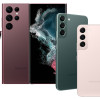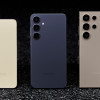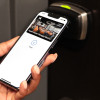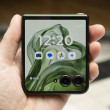Hands On with Qualcomm's Ultrasonic Fingerprint Scanner
Mar 2, 2015, 8:47 AM by Rich Brome @richbrome

Qualcomm has invented an entirely new fingerprint-scanning technology to secure your phone, and it's really quite interesting. Now that your phone is your wallet, this is a crucial technology. We met with them to discuss the details, and tried a demo. Read on for what we learned.
Qualcomm is a company that does a ton of R&D, and they're quite interested in security these days, especially as it became clear that mobile payments were going to take off. In looking at biometrics, they invented an entirely new type of fingerprint scanner that uses ultrasound to map your fingerprint in 3D. It's a bit like sonar, so much so that it even works better when your fingers are wet (though dry is certainly fine, too.)
Qualcomm invented and patented the technology, which consists of a sensor and a processing chip. Qualcomm makes the processing chip themselves (it's separate from the main Snapdragon processor, for now.) They don't make sensors, so they've licensed that part out to other companies to make. In a complete solution, it also uses the security features present in all Snapdragon chips for encryption, etc.
The company claims faster speed and better security due to greater detail. In the demos we tried, these advantages were clear. It recognized a valid fingerprint noticeably faster than an iPhone. The demo included a direct visual output of what the sensor "sees", where you could clearly see individual pores within a fingerprint. It's impressive.
That was with an exposed sensor, however. When put behind glass or metal, the detail is reduced, especially to a human eye looking at the raw output. You can still see a clear fingerprint, but not the pores, etc. But Qualcomm claims that its advanced processing sees what humans can't in that situation.
Qualcomm expects this tech to reach phones before the end of 2015. With Google buying Softcard and revving up Google Wallet again, expect to see a lot more phones with fingerprint readers like this in the coming months and years.
Comments
Fingerprint Scanning
(continues)
Plus, why does Samsung only...
(continues)
all the same








 Video: Live Demo of Snapdragon AI Noise Suppression
Video: Live Demo of Snapdragon AI Noise Suppression
 Samsung Refreshes Galaxy S Series with S Pen, New Cameras
Samsung Refreshes Galaxy S Series with S Pen, New Cameras
 Samsung S24 Series Adds More AI, Updates the Hardware
Samsung S24 Series Adds More AI, Updates the Hardware
 Hands On with the HMD Fusion and its Smart Outfits
Hands On with the HMD Fusion and its Smart Outfits
 Hyatt Launches Apple Wallet Room Keys
Hyatt Launches Apple Wallet Room Keys


